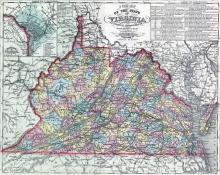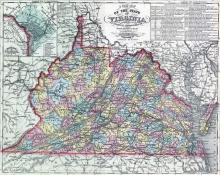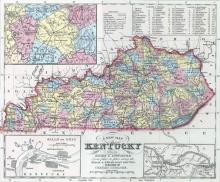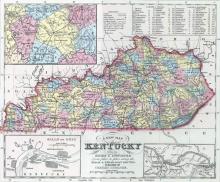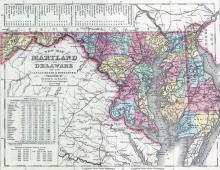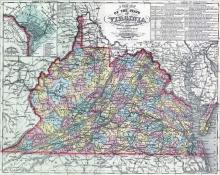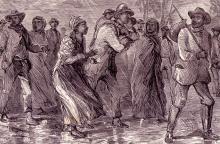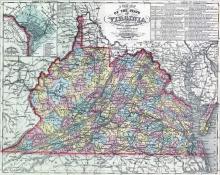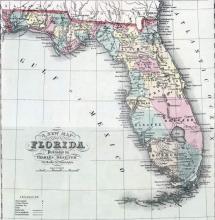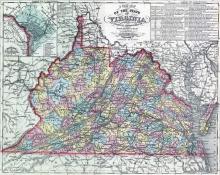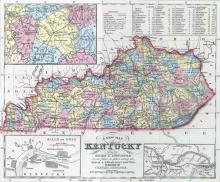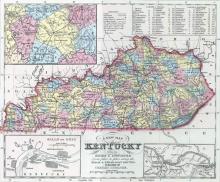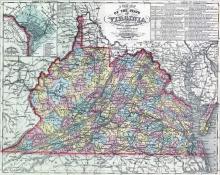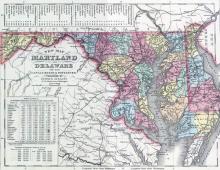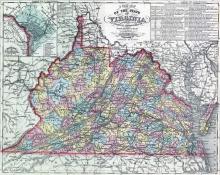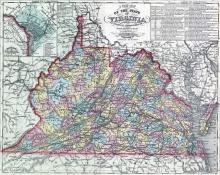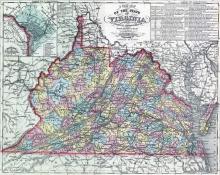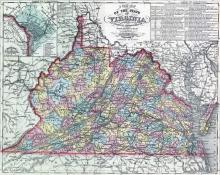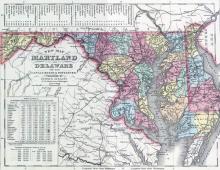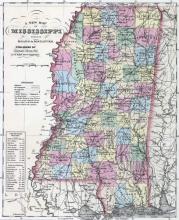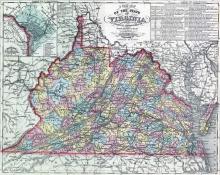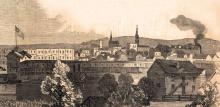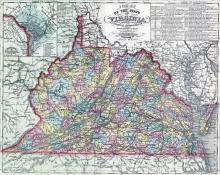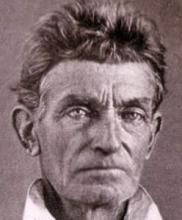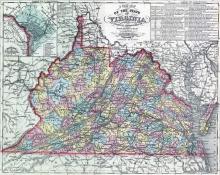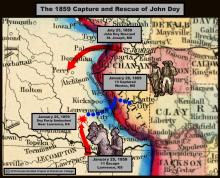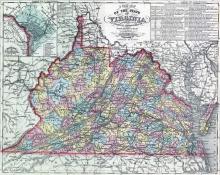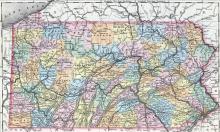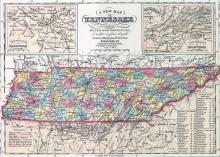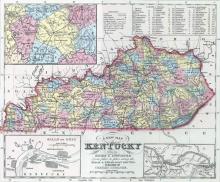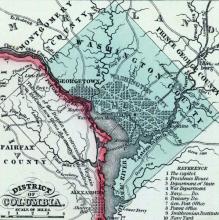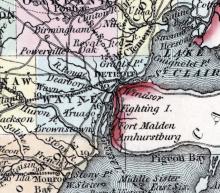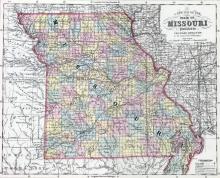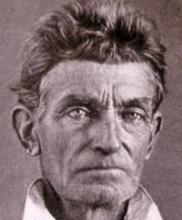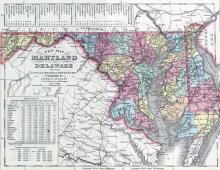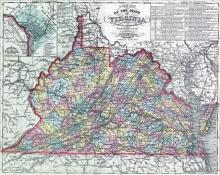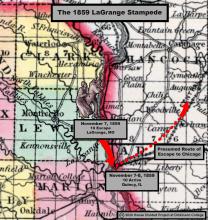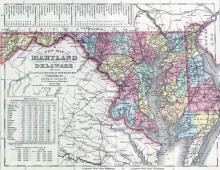Sometime in early September 1857, an attempted "stampede" was thwarted by local authorities in Petersburg, Virginia. A Philadelphia-bound ship was "suspected of having bargained for the wrong sort of cargo" after authorities got word that several enslaved people were planning to escape from bondage on the boat. The boat was searched at City Point, and the escape was apparently scuttled.
View All Stampedes, 1847-1865 // 1840s // 1850s // 1860s
Displaying 101 - 138 of 138
On Sunday, September 6, 1857, eight enslaved people escaped from multiple slaveholders in Loudon county, Virginia. Their ultimate destination and fate remain unknown.
On Sunday night, September 20, 1857, a group of 17 enslaved people escaped from Washington, near Maysville, Kentucky. Slave catchers set out in pursuit, and managed to overtake one of the freedom seekers. However, he "battled" his captors bravely, and managed to badly wound two slave catchers before being overcome and hauled off to the Maysville jail. The remainder of the freedom seekers "made their sailing clear," and apparently eluded recapture.
On the night of Thursday, October 1, 1857, five enslaved people escaped in a horse-drawn wagon from the Bourbon county, Kentucky farm of slaveholder Daniel S. Dillon. The five freedom seekers--three men and two women--made their way to the Ohio river, where they abandoned the horse and wagon and evidently crossed the river by skiff. Dillon set out in pursuit, only to find his wagon and horse abandoned near the river.
Sometime in early October 1857, eleven enslaved people escaped from Carroll county, Maryland. The freedom seekers passed through Carlisle, Pennsylvania on their way to freedom, though they were pursued by a posse of white Marylanders. Their ultimate fate remains unknown.
On Sunday night, October 18, 1857, ten enslaved people escaped from Norfolk, Virginia. Their ultimate fate remains unknown.
Throughout late October 1857, some 44 enslaved people escaped from the vicinity of Cambridge, Maryland. That number included a large group of 30, who escaped together on Saturday night, October 24. Slaveholders offered a $3,100 reward for their recapture, but the freedom seekers managed to elude slave catchers.
On Sunday night, November 8, 1857, a family of seven enslaved people--a father, mother, and their five children--escaped from Preston county, Virginia and headed towards Pennsylvania. They were recaptured near Uniontown, Pennsylvania, where despite making a "desperate resistance, fighting with knives, hatchets, &c." the freedom seekers were overpowered.
On the night of February 6, 1858, there was a "stampede" of 15 freedom seekers who escaped from Key West, Florida by boat. Local newspapers speculated that the group was heading toward Nassau in the Bahamas.
According to the Baltimore Sun, there was an Easter "stampede of slaves" on Sunday, April 4, 1858, involving at least seven from the Mason plantation in Loudon County (near Point of Rocks) and two more from Berkeley County, Virginia.
In early May 1858, the Louisville Courier reported on "an extraordinary stampede of the slaves" from Kentucky, claiming that they were fleeing "one, two, three, or a dozen at a time." The pro-slavery newspaper naturally blamed outside agitators, claiming "black republicans are as thick in these parts as wolves on a prairie." Multiple newspapers then reprinted and commented on this story.
Three enslaved people escaped from a Kentucky slaveholder named Hicks and crossed the Ohio River to Evansville, Indiana. Hicks hired an officer named Evans to recapture the three freedom seekers, but then refused to pay the slave catcher. An Evansville paper predicted that Hicks's decision not to compensate the slave catcher would cause trouble for other Kentucky slaveholders.
On Saturday night, June 19, 1858, at least 15 freedom seekers fled Lovettesville, Virginia in a "negro stampede," heading "for parts unknown."
In mid-July 1858, there was a reported "slave stampede" from Dorchester County, Maryland, involving six enslaved Blacks from three different owners: Dr. Tubman, Mrs. Dixon and R.L. Phillips.
On Saturday night, July 24, 1858, four Black men escaped from Moorefield, Virginia, allegedly heading toward Pennsylvania. The Richmond Enquirer first reported this story, which was then reprinted in the Charleston SC Courier, under the headline: "Slave Stampede."
Sometime in late July or early August 1858, there was a reported "stampede" from Virginia counties along the Maryland border that resulted in at least two of the freedom seekers getting arrested in Cumberland, Maryland and returned to their slaveholders.
On Saturday night, August 14, 1858, four Black men escaped from Hampshire County, Virginia in a reported "stampede." A local newspaper noted that the men had stolen four horses, which were eventually found near Cresaptown, Maryland.
On Saturday, August 14, 1858, six enslaved African Americans escaped from Barbour County, Virginia in a reported "slave stampede." Another four freedom seekers from Taylor County joined them on the same night.
On Tuesday, August 31, 1858, ten freedom seekers attempted an escape from West River near Annapolis, Maryland. Two were quickly recaptured but the rest of their group pursued them and after a "bold rush" and a "desperate fight," managed to liberate them temporarily. But according to news accounts, the fight left two Black men in the group "dangerously wounded," which "seemed to frighten and deter the negroes, because they as speedily as possible returned home to the
Senator Stephen A. Douglas of Illinois was married twice. His first wife Martha, who died in 1853, left him ownership of a large cotton plantation in Mississippi. This meant that Douglas, a powerful Democratic senator from a free state, was also a slaveholder in 1858, the year he campaigned against Republican Abraham Lincoln for reelection to the U.S. senate.
Around Thursday, September 23, 1858, seven freedom seekers from Charlestown, Virginia (now West Virginia) were captured near Chambersburg, Pennsylvania. They were returned to their slaveholders and soon, according to news reports, sold to "purchasers from abroad."
Around Saturday, October 30, 1858, six freedom seekers ("valued at $7,500") escaped from around Parkersburg, Virginia (now West Virginia) and remained at large. Local newspapers blamed the "stampede," on "free negroes, who are fast getting to be an intolerable nuisance."
Sometime in late October, ten freedom seekers, including five men, three women and two children, escaped from Prunytown, Virginia (now West Virginia) with "seven other chattels in the shape of horses." According to news reports, "They left the horses after the night ride and steered for the North Star on foot," until they were confronted by slave catchers in Fayette County, Pennsylvania. The group then engaged in "a desperate fight for freedom" and ultimately escaped. &
On December 20, 1858, abolitionist John Brown and a group of armed activists led a raid into Vernon county, Missouri, at the behest of enslaved Missourian Jim Daniels who was owned by James Lawrence. The raid freed Daniels, his family and several other enslaved people, 11 in total (12 following the birth of John Brown Daniels), escaping westward through Kansas.
Around Saturday, January 1, 1859, five freedom seekers fled Fairmont, Virginia (now West Virginia) heading toward western Pennsylvania. A local newspaper report labeled this a "Negro Stampede" while observing that the five runways "took a fine horse" from one of their slaveholders. This escape from what was then known as the "Virginia Panhandle" was only one of many stampedes during the period. Another newspaper noted: Our 'Mountain county' exchanges bring us
On January 25, 1859, abolitionist John Doy, two free African Americans Wilson Hays and Charles Smith, attempted to lead 11 freedom seekers from various locations across western Missouri to freedom in Iowa. They were recaptured near Lawrence, Kansas. Doy was later rescued from prison to great fanfare, while Smith and one of the freedom seekers, Bill Riley, also managed to escape Missouri authorities. The others, however, were not so fortunate, and apparently sold down to the Deep South.
Sometime in February 1859, there was a report that 23 freedom seekers escaped from the Virginia panhandle (now West Virginia), passing through Waynesburg, PA on their way toward Canada. According to a newspaper report, the runaways "were hotly pursued, but contrived to make good their escape." The report added, "A number more were piloted over the underground railroad some days before, in the same county."
After U.S. authorities arrested alleged runaway Daniel Webster in Harrisburg, Pennsylvania in early April 1859, reports described a "stampede" of fugitive slaves who had been residing in the city.
In early May 1859, the Detroit Advertiser reported that 75 freedom seekers "from the interior of Tennessee" had passed through their city by train on their way toward Canada. "This is probably the largest that ever escaped in one company," claimed the newspaper. But the newspaper also claimed that just a week earlier there other escapees, coming through Detroit in groups of seven and five, "making ninety-four in all," during the early part of the month, and "worth at
On Saturday, May 21, 1859, four Black men from Cynthiana, Kentucky "made a break" for the Ohio River. Two of them succeeded by crossing near Augusta, Kentucky, but the other two were caught. Local newspapers described this effort as a "stampede of slaves."
On Saturday, July 23, 1859 there was "a stampede of slaves" from Washington, DC according to the Washington Evening Star. "From the number that is missing," observed the newspaper, "it is thought that they were taken away in some northern vessel."
An antislavery vigilance operative in Detroit publicly boasted on September 28 that "quite a stampede" of more than fifteen freedom seekers had just passed safely through the city.
Sometime in October 1859, a group of 26 enslaved people escaped from western Missouri, and were guided by an antislavery operative through Kansas, Nebraska, Iowa, and Illinois, through Chicago and finally to Detroit.
On October 16, 1859, John Brown and his men raided the federal arsenal at Harpers Ferry, Virginia intended to raise an insurrection among the enslaved population and strike blow toward a general revolution against slavery. Yet at first, many newspapers identified the effort as an attempted slave stampede.
On Saturday night, October 22, 1859, just days after John Brown's failed raid in Harpers Ferry, Virginia, authorities in Carroll County, Maryland claimed that they had prevented a planned "stampede" of "some forty slaves." Newspapers claimed that one of the participants confessed to "the secret" and at least five ringleaders got arrested.
On Saturday night, October 22, 1859, "some thirty slaves" escaped from homes in Alexandria and Fairfax counties, Virginia. A North Carolina newspaper wondered if this was a mere "coincidence" coming just days after John Brown's failed raid at Harpers Ferry, Virginia, or if perhaps these freedom seekers were really supposed to be "reinforcements" for the assault on the federal arsenal.
In November 1859, a "stampede" of 10 enslaved people, who were not named, occurred from La Grange, Missouri. The escapees took a boat and apparently crossed the Mississippi river into Illinois.
On Monday, November 28, 1859, authorities in Cambridge, Maryland arrested six African Americans, accusing them have having attempted a "stampede."

